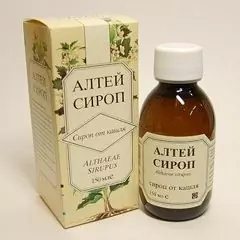Actemra
Instructions for use:
- 1. Release form and composition
- 2. Indications for use
- 3. Contraindications
- 4. Method of application and dosage
- 5. Side effects
- 6. Special instructions
- 7. Drug interactions
- 8. Analogs
- 9. Terms and conditions of storage
- 10. Terms of dispensing from pharmacies

Actemra is a drug with an immunosuppressive effect.
Release form and composition
Dosage forms of release of Actemra:
- Solution for subcutaneous administration: clear or opalescent, colorless or slightly yellowish liquid (0.9 ml in syringes-tubes, 4 syringes-tubes in a cardboard box or 1 syringe-tube in an auto-injector, 4 auto-injectors in a cardboard box);
- Concentrate for the preparation of a solution for infusion: transparent or opalescent, colorless or light yellow (in bottles of 4, 10 or 20 ml, 1 or 4 bottles in a cardboard box).
Composition of 0.9 ml (1 syringe tube) solution for subcutaneous administration:
- Active ingredient: tocilizumab - 162 mg;
- Auxiliary components: L-histidine - 1.4 mg; L-methionine - 4.03 mg; L-arginine - 0.132 mg; polysorbate 80 - 0.18 mg; L-histidine hydrochloride monohydrate - 1.9 mg; L-arginine hydrochloride - 18.8 mg; water for injection - up to 0.9 ml.
Composition of 1 ml of concentrate for preparation of infusion solution:
- Active ingredient: tocilizumab - 20 mg;
- Auxiliary components: polysorbate 80 - 0.5 mg; sucrose - 50 mg; sodium hydrogen phosphate dodecahydrate - in sufficient quantity; sodium dihydrogen phosphate dihydrate - in sufficient quantity, water for injection - in sufficient quantity.
Indications for use
- High to moderately active rheumatoid arthritis in adults - as monotherapy or in combination with methotrexate and / or with other basic anti-inflammatory drugs, incl. with the aim of inhibiting the x-ray proven destruction of the joints;
- Active polyarticular systemic idiopathic juvenile arthritis in adults and children from 2 years of age - as monotherapy or in combination with methotrexate (infusion solution).
Contraindications
Absolute:
- Active infectious diseases, including tuberculosis;
- Combined use with inhibitors of tumor necrosis factor alpha (TNFα) or use within one month after the end of therapy with anti-TNF antibodies;
- Age up to 2 years (in the treatment of polyarticular systemic idiopathic juvenile arthritis) and up to 18 years (in the treatment of rheumatoid arthritis);
- Hypersensitivity to drug components.
With caution, Actemru is prescribed for such conditions / diseases, following the recommendations:
- Infections: a history of indications of recurrent infectious diseases, as well as concomitant diseases that predispose to infections (due to the risk of developing infectious diseases). If serious infections occur, treatment is interrupted until the infection has cleared;
- Complications of diverticulitis: a history of indications of ulcerative lesions of the gastrointestinal tract or diverticulitis (due to the likelihood of diverticulum perforation). If symptoms appear, possibly indicating complicated diverticulitis, an immediate examination should be carried out for the early detection of gastrointestinal perforation;
- Hepatic failure and active liver disease: therapy with Actemra, especially when combined with methotrexate, may be associated with an increase in the activity of hepatic transaminases;
- Demyelinating diseases of the central nervous system: monitoring of the condition is necessary for early detection of symptoms that may indicate the development of the disease;
- Increased activity of hepatic transaminases (without signs of hepatic failure): the frequency of disorders increases when combined with drugs with a potential hepatotoxic effect (for example, methotrexate). Caution must be observed when the upper limit of the norm for alanine aminotransferase / aspartate aminotransferase indicators is exceeded by more than 1.5 times (if the excess is more than 5 times, treatment is canceled);
- Changes in lipid metabolism indicators: due to the risk of an increase in lipid metabolism indicators, in rheumatoid arthritis, its level must be assessed once in the period from 4 to 8 weeks from the beginning of the treatment course.
During pregnancy, the use of the drug is possible only if there is an obvious clinical need. To prescribe Actemra, lactating women need to correlate the expected benefit with the possible harm to the child (the safety profile has not been studied).
Method of administration and dosage
Actemra solution for subcutaneous administration should be administered using an autoinjector or a disposable syringe tube. The drug cannot be administered intravenously.
The first injection should be performed under the supervision of a qualified healthcare professional. It is recommended to change the injection site (anterior abdominal wall, shoulder or thigh). The drug should not be administered in the area of hematomas, scars, redness, moles, in the area of the skin with increased sensitivity, seals and injuries.
Before use, you need to make sure that there is no turbidity of the solution, color changes and the presence of foreign inclusions.
In the treatment of rheumatoid arthritis, Actemra is administered once a week at a dose of 162 mg. It is possible to carry out monotherapy or combined use with methotrexate and / or other basic drugs with anti-inflammatory action.
If the patient switches from intravenous to subcutaneous administration of Actemra, the first injection should be made instead of the planned intravenous infusion (the clinical efficacy of the active substance when administered subcutaneously is comparable to that when administered intravenously).
If symptoms of a serious allergic reaction occur, immediate medical attention may be required.
Correction of the dosage regimen with an increase in the activity of liver enzymes, depending on the excess of the upper limit of the norm - VGN:
- VGN> 1-3 times: before normalization of alanine aminotransferase or aspartate aminotransferase parameters, the frequency of administration is reduced to 1 injection every 2 weeks. It is possible to adjust the dose of simultaneously used anti-inflammatory drugs;
- UHN> 3-5 times: therapy is interrupted until the indicator decreases to a level less than 3 times the upper limit of the norm. The therapy can then be resumed as directed;
- VHN> 5 times: therapy is canceled.
Correction of the dosing regimen with a low absolute number of neutrophils - ANC (with a value of the indicator - the number of cells × 10 9 / l):
- ANC> 1: no correction required;
- AChN 0.5-1: therapy is interrupted. Its renewal is possible with an increase in the indicator to> 100 × 10 9 / μl at a frequency of administration 1 time every 2 weeks. If clinically necessary, return to standard dosing regimen;
- ANC <0.5: therapy is canceled.
Correction of the dosage regimen with a low number of platelets (with a value of the indicator - the number of cells × 10 3 / μl):
- 50-100: therapy is interrupted. Its renewal is possible with an increase in the indicator to> 100 × 10 3 / μl at a frequency of administration 1 time every 2 weeks. If clinically necessary, return to standard dosing regimen;
- <50: Discontinue therapy.
Infusion solution
Actemru is administered intravenously.
The recommended single dose for the treatment of rheumatoid arthritis is 8 mg / kg (administered for at least 1 hour). Frequency rate of application - 1 time per 4 weeks.
The maximum single dose for patients weighing more than 100 kg is 800 mg.
Before the introduction, a nurse or doctor should dilute the concentrate with 0.9% sodium chloride solution under aseptic conditions. The prepared infusion solution is physically and chemically stable for 24 hours at a temperature of 30 ° C (if it is not used immediately, it can be stored at a temperature of 2-8 ° C during the specified period).
Before use, you need to make sure that there is no turbidity of the solution, color changes and the presence of foreign inclusions.
Correction of the dosage regimen with an increase in the activity of liver enzymes (depending on the excess of the upper limit of the norm):
- VGN> 1-3 times: reduce the dose to 4 mg / ml or interrupt therapy until the alanine aminotransferase or aspartate aminotransferase indicators normalize. In the future, treatment is resumed at a dose of 4 or 8 mg / kg. It is possible to adjust the dose of simultaneously used anti-inflammatory drugs;
- UHN> 3-5 times: therapy is interrupted until the indicator decreases to a level less than 3 times the upper limit of the norm. The therapy can then be resumed as directed; with a steady increase in indicators, confirmed by a second study, therapy is canceled;
- VHN> 5 times: therapy is canceled.
Correction of the dosage regimen with a low absolute number of neutrophils (with a value of the indicator - the number of cells × 10 9 / l):
- ANC> 1: no correction required;
- AChN 0.5-1: therapy is interrupted. Its renewal is possible with an increase in the indicator to> 100 × 10 9 / μl at a dose of 4 mg / kg. If clinically necessary, return to standard dosing regimen;
- ANC <0.5: therapy is canceled.
Correction of the dosage regimen with a low number of platelets (with a value of the indicator - the number of cells × 10 3 / μl):
- 50-100: therapy is interrupted. Its renewal is possible with an increase in the indicator to> 100 × 10 3 / μl at a dose of 4 mg / kg. If clinically necessary, return to standard dosing regimen;
- <50: Discontinue therapy.
The recommended dosage regimen for the treatment of polyarticular juvenile idiopathic arthritis (single dose with a frequency of administration 1 time per 4 weeks, depending on body weight):
- <30 kg: 10 mg / kg;
- ≥30 kg: 8 mg / kg.
Dose adjustment is only possible with persistent weight changes.
The recommended dosage regimen for the treatment of systemic juvenile idiopathic arthritis (single dose with a frequency of administration 1 time per 2 weeks, depending on body weight):
- <30 kg: 12 mg / kg;
- ≥30 kg: 8 mg / kg.
Dose adjustment is only possible with persistent weight changes.
Side effects
Possible adverse reactions (very often (≥1 / 10), often (≥1 / 100 and <1/10), infrequently (≥1 / 1000 and <1/100), rarely (≥1 / 10,000 and <1 / 1000), very rare (<1/10 000, taking into account individual cases):
- Cardiovascular system: often - increased blood pressure;
- Nervous system: often - headache, dizziness;
- Digestive system: often - mouth ulcers, abdominal pain, gastritis; infrequently - stomatitis, perforation of the gastrointestinal tract, stomach ulcer;
- Endocrine system: infrequently - hypothyroidism;
- Immune system: often - hypersensitivity reactions; infrequently - anaphylactic reactions.
- Respiratory system: often - cough, shortness of breath;
- Urinary system: infrequently - nephrolithiasis;
- Hematopoietic system: often - leukopenia, neutropenia;
- Body weight and laboratory parameters: often - increased activity of hepatic transaminases, weight gain; infrequently - an increase in total bilirubin;
- Skin and its appendages: often - rash, urticaria, itching, phlegmon;
- Infections: very often - upper respiratory tract infections; often - infections caused by Herpes simplex type 1 and Herpes zoster; infrequently - diverticulitis;
- Organ of vision: often - conjunctivitis;
- Metabolism: often - hypercholesterolemia; infrequently - hypertriglyceridemia;
- The body as a whole: often - peripheral edema.
Additional information on adverse reactions in the treatment of rheumatoid arthritis when using the drug in any dosage form:
- Reactions at the site of subcutaneous injection: erythema, pruritus, pain, hematoma. As a rule, they are mild to moderate, go away on their own and do not lead to cancellation of therapy;
- Reactions after infusion: episodes of increased blood pressure. Within 24 hours after the end of the administration of Actemra, headache and reactions from the skin (in the form of a rash, urticaria) may occur. These violations usually do not lead to restriction of therapy;
- Immunogenicity: antibodies to tocilizumab were detected in 0.8% of the examined patients. Neutralizing antibodies were detected in all patients;
- Perforation of the gastrointestinal tract: in most cases in the form of complications of diverticulitis, including abscess, fistula, perforation of the lower gastrointestinal tract, diffuse purulent peritonitis;
- Infections (the following diseases may develop): phlegmon, pneumonia, infections caused by Herpes zoster, bacterial arthritis, diverticulitis, gastroenteritis, sepsis, in some cases they were fatal. The development of opportunistic infections was recorded.
Additional information on adverse reactions in the treatment of polyarticular juvenile idiopathic arthritis when using Actemra as an infusion solution:
- Infections: Upper respiratory tract infections and nasopharyngitis are most common. Significantly more often these disorders were observed in patients with body weight <30 kg;
- Reactions after infusion: by their nature do not differ from those that developed in patients with rheumatoid arthritis;
- Immunogenicity: a single case of the presence of antibodies to tocilizumab without the development of a hypersensitivity reaction.
Additional information on adverse reactions in the treatment of polyarticular systemic idiopathic arthritis when using Actemra as an infusion solution (in most cases, they do not differ from those in patients with rheumatoid arthritis):
- Reactions after infusion: undesirable effects at the site of intravenous administration: urticaria (a serious phenomenon), rash, arthralgia, epigastric discomfort, diarrhea, headache, etc. In very rare cases, clinically significant hypersensitivity reactions have been reported requiring discontinuation of the drug;
- Infections: similar to those seen in rheumatoid arthritis, except for otitis media and chickenpox;
- Immunogenicity: antibodies to the active substance were detected in 2 out of 112 examined patients. In 1 case, a hypersensitivity reaction developed, which required discontinuation of treatment.
special instructions
Replacement of Actemra with any other biological preparations must be agreed with the attending physician.
During therapy, you should consider:
- Hypersensitivity reactions: As a result of post-marketing use of the drug for intravenous administration, serious hypersensitivity reactions have been recorded, including anaphylaxis. These disorders can be severe and potentially fatal in patients who have previously had hypersensitivity reactions when used in combination with premedication with glucocorticosteroids and antihistamines. If anaphylactic reactions or other serious hypersensitivity reactions develop, Actemra should be discontinued immediately and appropriate treatment should be carried out. In the future, the drug cannot be used;
- Tuberculosis: prior to the appointment of therapy, it is necessary to conduct a preliminary examination of the patient for the presence of latent tuberculosis. If it is detected, before the appointment of Actemra, a standard course of antimycobacterial therapy is carried out;
- Immunization: Immunization with live and live attenuated vaccines should not be performed during therapy (safety profile not established). Prior to the appointment of Aktemra, it is recommended to vaccinate in accordance with the national immunization schedule (with respect to the interval);
- Reactivation of viral infections: cases of reactivation of a viral infection (for example, viral hepatitis B) have been reported. Patients with a positive result on screening for hepatitis were not included in clinical trials of the drug;
- Changes in laboratory parameters: possible development of neutropenia and thrombocytopenia.
Patients with systemic juvenile idiopathic arthritis may develop macrophage activation syndrome (a serious life-threatening condition). The safety profile of Aktemra in this case has not been studied.
During the use of Actemra, the development of dizziness may be observed, and therefore, when it occurs, patients are advised to refuse to drive until the condition normalizes.
Drug interactions
The combined use of 10 mg / kg of Actemra with 10-25 mg of methotrexate with a frequency of administration once a week has not been found to have a clinically significant effect on the exposure of methotrexate.
Concomitant use with other anti-inflammatory drugs has not been studied.
Analogs
Analogs of Aktemra are: Ilaris, Zenapax.
Terms and conditions of storage
Store in a dark place, out of reach of children, at a temperature of 2-8 ° C, do not freeze.
The shelf life is 2.5 years.
Terms of dispensing from pharmacies
Dispensed by prescription.
Information about the drug is generalized, provided for informational purposes only and does not replace the official instructions. Self-medication is hazardous to health!







